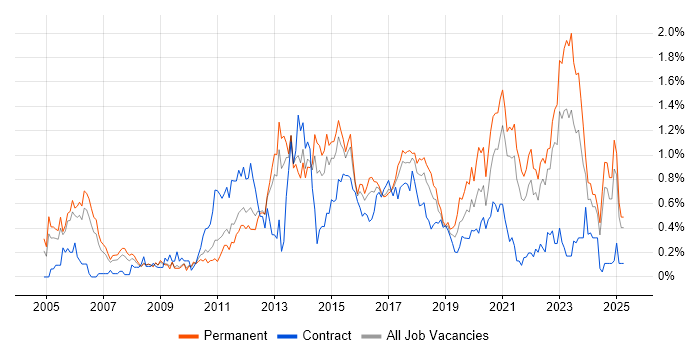Data Structures
South West > Bristol
The table below looks at the prevalence of the term Data Structures in permanent job vacancies in Bristol. Included is a benchmarking guide to the salaries offered in vacancies that cited Data Structures over the 6 months leading up to 18 May 2025, comparing them to the same period in the previous two years.
| 6 months to 18 May 2025 |
Same period 2024 | Same period 2023 | |
|---|---|---|---|
| Rank | 86 | 148 | 134 |
| Rank change year-on-year | +62 | -14 | +26 |
| Permanent jobs citing Data Structures | 17 | 15 | 37 |
| As % of all permanent jobs advertised in Bristol | 1.36% | 0.48% | 1.44% |
| As % of the Miscellaneous category | 4.99% | 1.54% | 3.66% |
| Number of salaries quoted | 4 | 15 | 29 |
| 10th Percentile | - | £55,271 | £51,833 |
| 25th Percentile | £70,097 | £68,718 | £56,052 |
| Median annual salary (50th Percentile) | £71,991 | £92,778 | £59,526 |
| Median % change year-on-year | -22.40% | +55.86% | +44.31% |
| 75th Percentile | £73,886 | £132,833 | £69,650 |
| 90th Percentile | - | £155,665 | £72,647 |
| South West median annual salary | £70,000 | £70,576 | £59,526 |
| % change year-on-year | -0.82% | +18.56% | +25.32% |
All Generic Skills
Bristol
Data Structures falls under the General and Transferable Skills category. For comparison with the information above, the following table provides summary statistics for all permanent job vacancies requiring generic IT skills in Bristol.
| Permanent vacancies with a requirement for generic IT skills | 341 | 974 | 1,011 |
| As % of all permanent jobs advertised in Bristol | 27.37% | 31.07% | 39.25% |
| Number of salaries quoted | 210 | 729 | 609 |
| 10th Percentile | £29,950 | £36,250 | £36,850 |
| 25th Percentile | £45,000 | £47,000 | £46,650 |
| Median annual salary (50th Percentile) | £61,250 | £60,000 | £60,249 |
| Median % change year-on-year | +2.08% | -0.41% | +0.42% |
| 75th Percentile | £77,500 | £77,500 | £77,715 |
| 90th Percentile | £95,250 | £88,250 | £95,000 |
| South West median annual salary | £51,600 | £50,000 | £54,882 |
| % change year-on-year | +3.20% | -8.90% | +4.54% |
Data Structures
Job Vacancy Trend in Bristol
Job postings citing Data Structures as a proportion of all IT jobs advertised in Bristol.

Data Structures
Salary Trend in Bristol
3-month moving average salary quoted in jobs citing Data Structures in Bristol.
Data Structures
Co-occurring Skills and Capabilities in Bristol by Category
The follow tables expand on the table above by listing co-occurrences grouped by category. The same employment type, locality and period is covered with up to 20 co-occurrences shown in each of the following categories:
|
|
||||||||||||||||||||||||||||||||||||||||||||||||||||||||||||||||||||||||||||||||||||
|
|
||||||||||||||||||||||||||||||||||||||||||||||||||||||||||||||||||||||||||||||||||||
|
|
||||||||||||||||||||||||||||||||||||||||||||||||||||||||||||||||||||||||||||||||||||
|
|
||||||||||||||||||||||||||||||||||||||||||||||||||||||||||||||||||||||||||||||||||||
|
|
||||||||||||||||||||||||||||||||||||||||||||||||||||||||||||||||||||||||||||||||||||
|
|
||||||||||||||||||||||||||||||||||||||||||||||||||||||||||||||||||||||||||||||||||||
|
|||||||||||||||||||||||||||||||||||||||||||||||||||||||||||||||||||||||||||||||||||||
